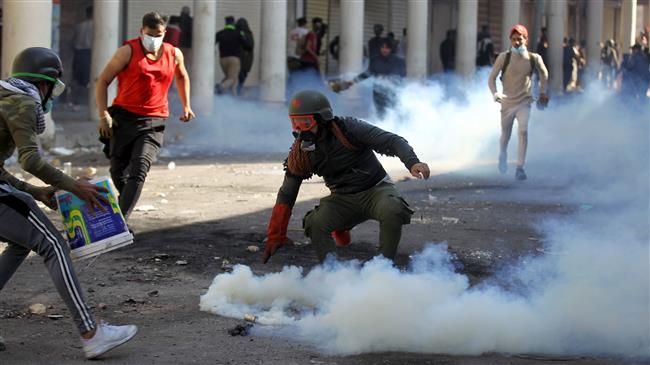Alwaght- Ayatollah Sayyed Ali al-Sistani, Iraq’s top Shiite cleric, urged politicians and legislators to speed up reforming electoral laws, arguing that nothing but the changes can resolve weeks of protests across the Arab country.
“The religious authority has made clear its position on peaceful protests calling for reform in the last Friday's sermon. It stressed that the demonstrations must be peaceful and free from any violence and vandalism. It also underlined the sanctity of the Iraqi blood, and the need for political forces to respond to the rightful demands of protesters,” Ayatollah Sistani said in a statement read out by his representative Abdul Mahdi al-Karbalaei during a sermon in the holy city of Karbala on Friday, Press TV reported.
He added, “We affirm the importance of speeding up the passing of the electoral law and the electoral commission law because this represents the country moving past the big crisis.”
Three anti-government protesters were killed in clashes with security forces on bridges across the Tigris in Baghdad on Friday.
A medical source, speaking on condition of anonymity, told AFP that the deaths came as riot police fired tear gas and live rounds to keep crowds from crossing over to the western bank of the river Tigris.
Two of them were reportedly shot dead and the third died from trauma injuries from a tear gas canister. Another 30 protesters were wounded as well.
Iraq's embattled Prime Minister Adel Abdul-Mahdi said in a statement on November 9 that new electoral reforms would be announced in the "coming few days," but fell short of giving further details.
The 77-year-old also said ongoing protests were important in bringing about reform, but must allow for a return to normal life.
“The protests have helped and will help pressure political groups, the government ... to reform and accept change,” Abdul-Mahdi said at the time.
He added, “However continuing protests must allow for a return to normal life, which will lead to legitimate demands being met.”
Influential Iraqi Shiite cleric Muqtada al-Sadr has called upon legislators to introduce sweeping reforms in the wake of ongoing anti-government protests in the country, dismissing any US and foreign intervention in Iraq’s domestic affairs.
Sadr, in a series of posts published on his Twitter page on November 13, called on Iraqi people to “continue (their) peaceful protests through rational means, and not to endanger Iraq and plunge the country into a dreadful [political] vacuum.”
“Revolutionaries should dispel the shadow of American or any foreign intervention; and even of those elements who are sitting behind the keyboards of their computers and implementing the US and others' colonial schemes ... Revolutionaries should not attack diplomatic missions or embassies, or chant slogans as such behavior does not fall within our ethics,” he pointed out.
Sadr asked Iraqi parliamentarians to pass radical reforms, such as changing the Independent High Electoral Commission, electoral law and several constitutional clauses.
Protesters in Iraq have directed their rage at a class of elite leaders, whom they accuse of pillaging the oil-rich country's wealth while the population grows poorer.
The protests, which began more than a month ago, have often turned violent.
Abdul-Mahdi has vowed that the government and judiciary would continue to investigate the deaths of the protesters, and that all demonstrators who have been arrested in the past several weeks would be released.
According to President Barham Salih, the prime minister is willing to resign if parties agree on a replacement.



























